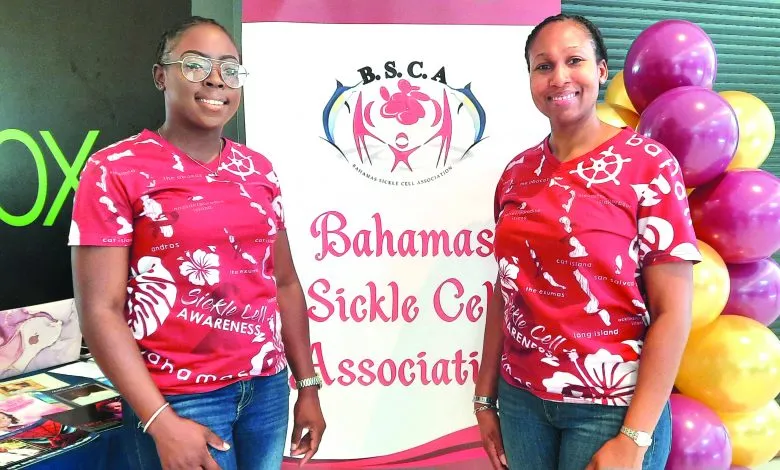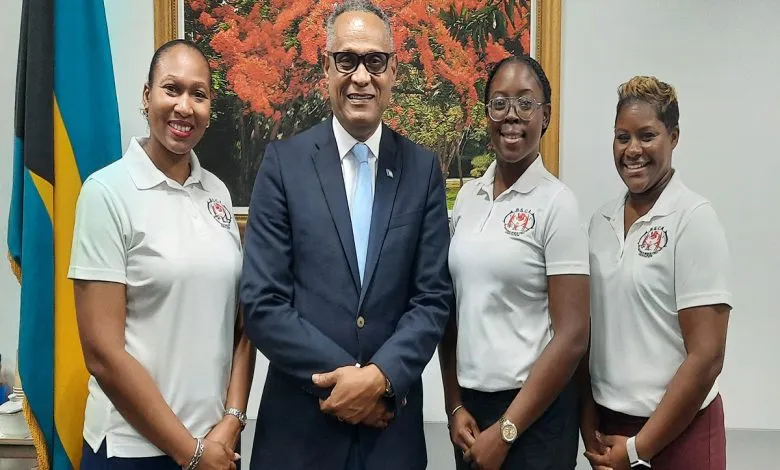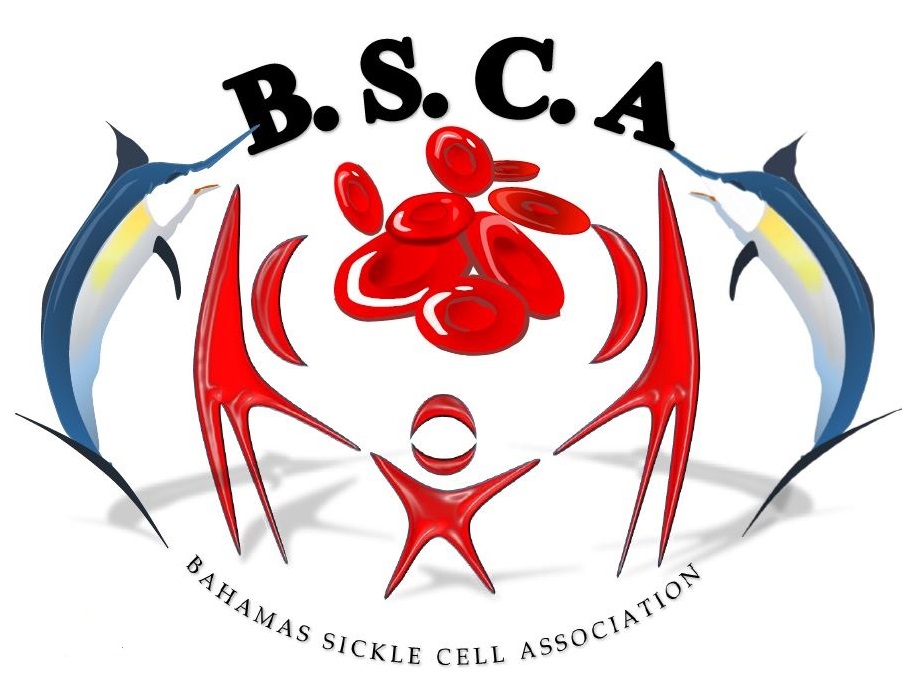
Bahamas Sickle Cell Association blood drive raises awareness
Sabascio Armbrister went to the mall to purchase a new phone, but a chance encounter with a member of the Bahamas Sickle Cell Association (BSCA) prompted him to step forward to donate a pint of blood for the very first time; it could save up to three lives.
“I always wanted to do it, but I was scared to. I’m not scared as much as I used to be, so I decided to just do it. We should give blood to help those who need it,” said Armbrister, following the 10-minute process, which was almost painless, if one discounts the tiniest pinch of a needle at the beginning. Giving blood is a quick and easy way to save lives. Still, many Bahamians are
hesitant to undergo the procedure, unless the person in need is a relative or close friend. The result is a chronic shortage of blood at Princess Margaret Hospital’s Blood Bank, which places patients’ lives at risk.
Chief among them, those diagnosed with sickle cell disease (SCD) – a painful, inherited blood disorder that plague millions worldwide. SCD patients could require multiple blood transfusions over the course of a lifetime.
That’s because sicklers have abnormal hemoglobin, the substance in red blood cells that carries oxygen throughout the body. It leads to deformed, crescent-shaped blood cells that do not carry oxygen well. They also have a shorter life span than normal. To make matters worse, when these C-shape, red blood cells move through small blood vessels, they could stick together and clog them, causing pain, organ damage and strokes.
“Having this blood drive is not only to replenish the blood supply at the blood bank but it’s also to identify persons who are willing to come forward to donate, so that when we have warriors in need of blood, we would have already collected a pool of potentially willing candidates which could speed up the blood transfusion process and help to preserve lives,” said Kristin Beneby, BSCA president.
Between October to December of last year, Beneby, a married mother of one, had to undergo three blood transfusions herself.
She is not alone. Regular blood transfusions are used to treat anemia and can help prevent other symptoms associated with sickle cell, including strokes and acute chest syndrome, which is when blood flow to the lungs becomes blocked.
“It really is a life-or-death situation when it comes to a sickler needing a blood transfusion. It’s something that needs to happen very quickly to ensure their quality of life. When you come out and donate, you are giving back in a big way,” said Amanda Dean, the association’s secretary.
Dean’s daughter is a sickler. She had her first blood transfusion when she was only six months old. When the now-seven-year-old was hospitalized this past July, a blood screening revealed she had developed antibodies from previous transfusions, making it even more challenging to find a donor.
That’s why blood drives, like the one recently hosted by the BSCA in conjunction with the Danielle Ferguson-Gibbs Foundation, are so important.
In Exuma, BSCA Director Kerisca Kemp organized a similar initiative at Exuma Primary Health Care Centre.
“Most of the persons who participated in the screening were not aware of what sickle cell was or what it meant to have the trait. We shared knowledge of the disease and distributed pamphlets and flyers. We are making inroads, but we have our work cut out for us,” said Kemp.
Among the persons donating blood Saturday was Dameeka Roberts. She was accompanied by her son, Arjay, and her sorority, Delta Sigma Theta.
“I had my mind made up to do this in memory of our soror, Danielle Ferguson-Gibbs. Considering all of the incidents we have in our community that create a need or a strain on the blood bank, it’s imperative that we all take the position to give when we can.”
Roberts’ sorority president, Valderez Miller, of the Nassau, Bahamas alumnae chapter of Delta Sigma Theta Sorority Inc., presented the Danielle Ferguson-Gibbs Foundation with a $1,000 check.
Ferguson-Gibbs, a former BSCA board member and executive board member of the sorority, died earlier this year from sickle cell disease.
More recently, the sorority lost another member, Taliah Cooper, to SCD.
“We thought it important to always be our sisters’ keeper, even in death. So, we came out to day to support the foundation and the Bahamas Sickle Cell Association,” said Miller.
Another attendee and donor, Joseph Ferguson, viewed his donation as a way to make a difference in the lives of others.
“Every so often, I do this,” said Ferguson, who learned about the event via Facebook.
“It makes me feel like I’ve helped someone. The hospital always needs blood. You might save a life.”
Throughout September, Sickle Cell Awareness Month, the association has focused on raising awareness and educating the wider community about SCD. Throughout the year, the advocacy group works to provide financial support to sickle cell warriors and their families.
“Not only are we working to boost our membership numbers, we are also working to gauge just how prevalent sickle cell is in The Bahamas,” said Beneby.
“We continue our call for free sickle cell screening at birth and during blood drives such as this one, with the goal of creating a National Sickle Cell Registry.”
Other long-term goals of the association include transforming the accident and emergency experience throughout hospitals in The Bahamas; expanding the organization’s physical presence into more Family Islands; establishing a home to provide temporary accommodations for sickle cell warriors from the Family Islands traveling to New Providence for treatment; and the creation, passing and enforcement of a Sickle Cell Disease Care Act.
For those interested in joining the BSCA, there are opportunities to assist in administration, education, social and support, as well as financial and fundraising.

Sickle Cell Association President observes special month with a courtesy call at the Office of the Governor General
On Wednesday, September 21, 2022, at the Office of the Governor General, Cynthia Alexandra Pratt, Deputy to the Governor General received in a courtesy call the President of The Bahamas Sickle Cell Association, Mrs Kristin Beneby (left), and Secretary Amanda Dean (right), as they observe September as “National Sickle Cell Month”.

Sickle cell screening, national registry could identify trends in population
Two of the Bahamas Sickle Cell Association’s long-term appeals to government – mandatory newborn sickle cell screening and the establishment of a national registry -could become a reality.
Health Minister Dr. Michael Darville said as much during a recent meeting with the non-profit’s executives and other high-ranking members of his team.
“You are advocating for screening for everyone which is something that we can look at because we are expanding our packages with National Health Insurance Authority for our primary health care component,” advised Darville.
“We need to get resources and we must take into consideration the screening for sickle cell, additional hematology, additional chemistry and additional cancer screening. They are the things we want to get in because all of those are a part of a robust primary healthcare component to try to keep people out of hospital.”
He cautioned, however, that the cost associated with additional screening could be a dealbreaker if the government finds it too exorbitant. The association assured him it was not.
The health minister said he’s looking to repeal The Bahamas National Health Insurance (NHI) Act 2016 due to its limitations. In the coming weeks, the Davis administration will look to expand the basic healthcare package under a new NHI Bill 2022.
NHI aims to deliver “accessible, affordable, and quality healthcare for the benefit of all Bahamians.”
For The Bahamas Sickle Cell Association, whose goal is to educate and champion the rights of sicklers, robust screening is among its top four priorities.
“The importance of newborn sickle cell screening is to prevent babies from being vulnerable to infections and health complications by prompt diagnosis. It allows parents to seek proper medical attention for warriors from early, ultimately improving their quality of life,” said Kristin Beneby, BSCA’s president.
“I myself was born at the Princess Margaret Hospital. This test was not available for me. After repeated pain crisis and hospital admissions, doctors began to look deeper into what was causing severe pain episodes. At the age of five, I was diagnosed with Hemoglobin SS, which is the most severe form of sickle cell disease. Had this test been available at birth, I am confident I would have been able to be treated promptly and adequately. The mandatory newborn screening will prepare Bahamians to take on this life-threatening disease.”
Sickle cell disease is the name for a group of inherited health conditions that affect red blood cells, causing them to be unusually shaped and to clump together. These sickly red blood cells don’t live as long as healthy ones and can block blood vessels. A serious, life-long condition more common among Black people, sickle cell can restrict the flow of oxygen through the body. When that happens, it causes excruciating pain, that is known as a sickle cell crisis.
“Being forewarned is the first tool,” said Amanda Dean, the BSCA’s secretary. “With the newborn screening and the reporting, it would allow us to get data and data is key in how we can address the issues. If we don’t know what our numbers are, then we don’t know what medical resources we require for the sickle cell population.”
Around the world, national registries generate high quality, evidence-based data which can then be used to estimate the disease burden, trends in the population and mortality rate. It could also contribute to prevention, control and treatment.
“We are now looking very closely at our Cancer Registry with the intent to expand it to incorporate some of the chronic non-communicable diseases (NCDs) and sickle cell may be one of those we have to add to it as well,” Dr Darville noted.
“We need to know how many patients are in The Bahamas with sickle cell. We need to know the genetic makeup so that we can advise couples. It creates red flags if we know that you are on our registry and you have full blown or you have a trait and we know your partner, then we know that we need to do a screening.”
Other NCDs he’d like to incorporate into the cancer registry include hypertensive and diabetic patients who are very ill and individuals with polycystic kidney disease. The health minister said in The Bahamas, there is a genetic predisposition to the latter. Much like sickle cell, polycystic kidney runs in families.
“Primary health care insurance allows individuals to go to a physician of their choice and be screened on a yearly basis to look at various health indicators,” said Darville.“…We do not want people to present to our facilities with advance stages of diseases that we can keep at a level to prevent them from being admitted to hospital.”
